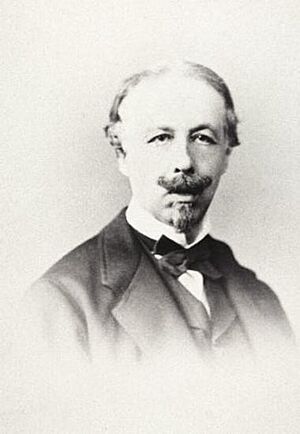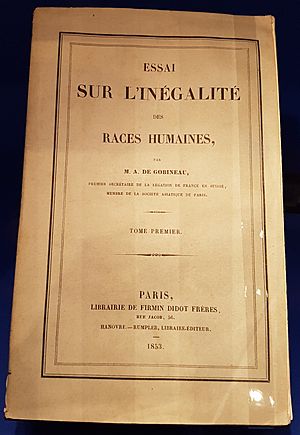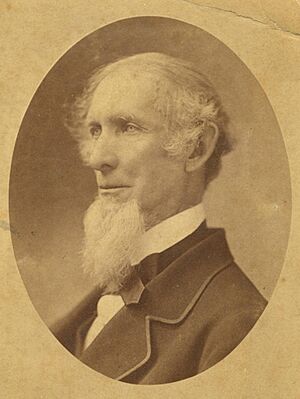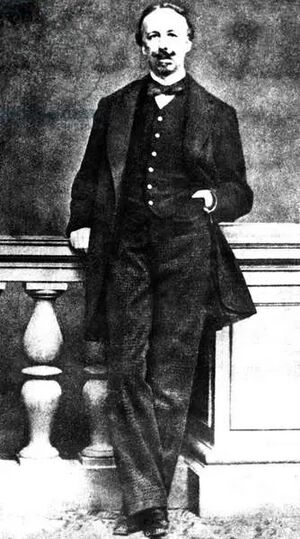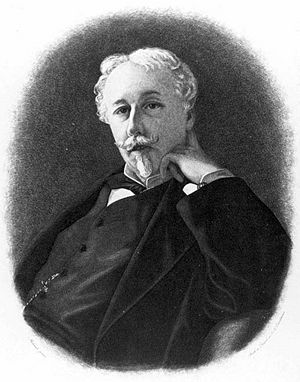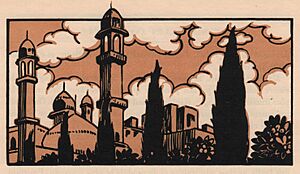Arthur de Gobineau facts for kids
Joseph Arthur de Gobineau (born 14 July 1816, died 13 October 1882) was a French writer and diplomat. He is most famous for his ideas about race. These ideas are now seen as a form of pseudoscience. This means they look scientific but are not based on real science. He believed in a so-called "Aryan master race." He thought that some groups of people were naturally better than others. This idea is part of Nordicism.
Gobineau came from a noble family. He believed that aristocrats (people from noble families) were better than common people. He wrote a book called An Essay on the Inequality of the Human Races. He wrote it after the Revolutions of 1848 (a series of uprisings in Europe). In this book, he argued that aristocrats had more "Aryan" traits. He claimed this was because they mixed less with what he called "inferior races." These ideas are widely rejected today.
Gobineau supported the idea of kings ruling France. He was a Legitimist. He did not like the French Revolution, democracy, or the rulers who came after the July Revolution in 1830. He worked as a diplomat for France. He served in countries like Persia (modern-day Iran), Brazil, Greece, and Sweden. Besides his controversial essays, Gobineau also wrote novels, short stories, and travel books. However, he had no real training in anthropology (the study of human societies and cultures).
Many people in France did not like Gobineau's ideas. But some people in America who supported slavery and white supremacy praised his work. They translated his book into English but left out parts that criticized Americans. His ideas also influenced some groups in Germany. This included people who held anti-Jewish views and later, leaders of the Nazi Party.
Early Life and Ideas
Family Background
Gobineau's family was noble. His father, Louis de Gobineau, was a soldier who strongly supported the king. His mother, Anne-Louise Magdeleine de Gercy, came from a family that worked for the king.
Gobineau disliked the French Revolution. He once said, "My birthday is July 14th, the date on which the Bastille was captured—which goes to prove how opposites may come together." As a boy, he loved the Middle Ages. He thought it was a wonderful time of brave knights.
His father was loyal to the House of Bourbon (the royal family). He was even jailed for a while by Napoleon's police. After Napoleon was defeated, Louis de Gobineau became a captain in King Louis XVIII's Royal Guard. However, the family struggled with money.
Growing Up and Early Interests
Gobineau spent his early teens in Inzligen, Germany, where his mother lived. He learned to speak German well. His father, a strong supporter of the Bourbon kings, had to retire after the July Revolution of 1830. This revolution brought King Louis-Philippe to power. Gobineau saw this as a disaster for France.
As a young man, Gobineau was very interested in the "Orient." This is what people in Europe called the Middle East in the 19th century. He loved stories from the Middle East translated by Antoine Galland. He wanted to become an Orientalist (an expert on Eastern cultures). In 1835, he failed the entrance exams for a military school.
In September 1835, Gobineau went to Paris to become a writer. He lived with his uncle, who also disliked King Louis-Philippe.
First Writings
During the later years of King Louis-Philippe's rule, Gobineau earned money by writing stories and articles. He wrote for very conservative magazines. He often struggled with money.
His family supported the House of Bourbon. But Gobineau was disappointed with the leaders of this movement. He felt that French society was corrupt and selfish. He became very pessimistic about the future.
Gobineau became friends with Alexis de Tocqueville, a famous writer and thinker. Tocqueville later gave Gobineau a job in the French foreign ministry. In 1841, Gobineau had his first big success. An article he wrote about the Greek leader Count Ioannis Kapodistrias was published in Revue des deux Mondes, an important magazine.
Views on Other Nations
Gobineau generally had negative views of other nations. He saw Britain as greedy. He worried about Russia's growing power. He had mixed feelings about German states. He liked conservative Prussia but disliked the multi-ethnic Austrian Empire. He was also pessimistic about Italy, Spain, and Latin America. He criticized the United States for focusing on wealth.
Marriage
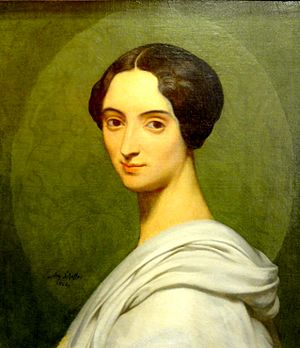
In 1846, Gobineau married Clémence Gabrielle Monnerot. She was from Martinique, an island in the Caribbean.
Diplomatic Work and Racial Theories
Early Diplomatic Roles
The Revolution of 1848 greatly worried Gobineau. He supported Louis-Napoleon Bonaparte (later Emperor Napoleon III). He saw him as someone who could keep order. In 1849, his friend Tocqueville, then Foreign Minister, gave Gobineau a job as his chief assistant.
From 1849 to 1854, Gobineau worked at the French diplomatic mission in Bern, Switzerland. During this time, he wrote most of his Essai. He also worked in Hanover, Germany. In 1854, while in Frankfurt, he became good friends with the Austrian diplomat Anton von Prokesch-Osten. They shared similar conservative views.
Gobineau's Racial Theories
During his lifetime, Gobineau was mainly known as a novelist and poet. However, he considered his book Essai sur l'inégalité des races humaines (An Essay on the Inequality of the Human Races) his most important work. He used the now-discredited ideas of scientific racism to argue that aristocrats were superior to commoners because of their race.
An Essay on the Inequality of the Human Races
In his book An Essay on the Inequality of the Human Races, published in 1855, Gobineau claimed that different races had different levels of civilization. He placed the 'European' race at the most developed stage. He argued that race determined a person's destiny. He wrote:
"Let us leave aside these puerilities [childish things] and compare together not men, but groups."
Gobineau's main idea was that European civilization came from an ancient "Aryan" culture. He later said "Aryan" meant only the "Germanic race," and claimed they were superior. These ideas are not accepted by science today.
Reaction to the Essay
The Essai received mostly negative reviews in France. The historian George Mosse argued that Gobineau used his dislike of the French middle and working classes in his descriptions of Asian and Black people. Gobineau's negative descriptions of French peasants were very similar to his views on Black people.
Time in Persia
In 1855, Gobineau went to Tehran, Persia (now Iran), as a French diplomat. He studied ancient texts. He admired ancient Persia, seeing it as a great Aryan civilization. But he was critical of modern Persia. His experiences led to two books.
American Supporters
In 1856, two American writers, Josiah C. Nott and Henry Hotze, translated Gobineau's Essai into English. They were strong supporters of white supremacy and slavery. They used his anti-Black writings to justify slavery. They shortened the book a lot, removing Gobineau's criticisms of Americans. For example, Gobineau had called white Americans:
"a very mixed assortment of the most degenerate races in olden-day Europe... Absolutely nothing productive will result from it..."
Nott and Hotze kept only the parts about the supposed inferiority of Black people.
Time in Newfoundland
In 1859, Gobineau was sent to Newfoundland for a diplomatic mission. He disliked Newfoundland's cold, foggy weather. He described the Irish immigrants in St. John's negatively. However, he praised some remote fishing settlements. He believed their isolation preserved "racial purity."
Later Diplomatic Career
Minister to Persia (Second Time)
In 1861, Gobineau returned to Tehran as the French minister. He became very interested in ancient Persia. He tried to prove it was founded by Aryans. In 1865, he published Les religions et les philosophies dans l'Asie centrale ("Religions and Philosophies in Central Asia"). He had a low opinion of Islam. He believed that Shia Islam in Persia was a kind of "revolt" by Aryan Persians against Semitic Arabs.
Minister to Greece
In 1864, Gobineau became the French minister to Greece. He enjoyed his time in Athens, writing poetry and studying ruins. He initially supported Greek expansion. But he later advised against it. During a Christian Greek rebellion on the island of Crete in 1866, Gobineau told people seeking French help that France would not support them. A scandal involving leaked diplomatic papers led to his recall from Athens.
Minister to Brazil
In 1869, Gobineau was appointed French minister to Brazil. He disliked Brazil. He saw its mixed-race population as proof of his theories about racial decline. He wrote that Brazilians were "fearfully ugly." His only friend there was Emperor Pedro II. After a public fight, Gobineau was asked to leave Brazil in 1870.
Return to France
Gobineau returned to France in May 1870. France lost a war with Prussia that year. Gobineau claimed the defeat proved his racial theories. During the war, he was the mayor of a small town called Trie. After the Prussians occupied Trie, he managed to get along with them.
Minister to Sweden
In May 1872, Gobineau became the French minister to Sweden. He was initially impressed. He called Swedes "the purest branch of the Germanic race." However, he later criticized them when King Oscar II allowed democracy.
In Sweden, Gobineau became close friends with the German diplomat Philipp, Prince of Eulenburg. Gobineau wrote several books, including novels and a history trying to prove he was descended from Vikings. In 1877, he was forced to resign from the diplomatic service. He spent his last years in Rome.
Legacy and Influence
Gobineau's ideas, though widely rejected by modern science, had an influence in several countries. His theories about race were used by others to support racist ideas and policies. However, modern science and scholarship have shown that his ideas about racial hierarchy and "purity" are false and harmful.
See also
 In Spanish: Joseph Arthur de Gobineau para niños
In Spanish: Joseph Arthur de Gobineau para niños
 | Mary Eliza Mahoney |
 | Susie King Taylor |
 | Ida Gray |
 | Eliza Ann Grier |


